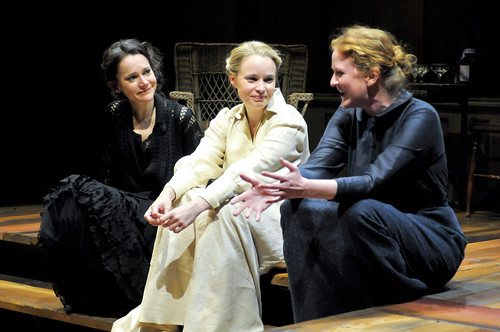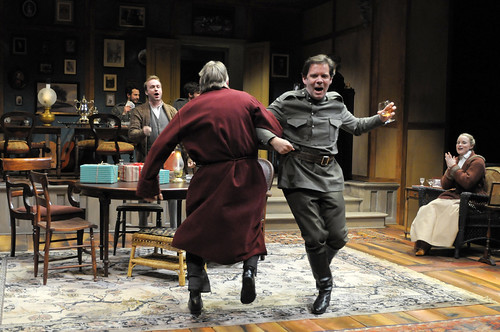Vodka, misery and beauty: family time with Three Sisters
 Chekhov’s three sisters, (from left) Natalia Payne as Masha, Heather Wood as Irina and Wendy Rich Stetson as Olga contemplate the far-off dream of returning to Moscow in Berkeley Repertory Theatre’s Three Sisters. Below: moments of merriment relieve some of the Russian gloom. Photos by mellopix.comTime aches in Berkeley Repertory Theatre’s elegiac Three Sisters. The past is where true happiness lived (in Moscow), and the future holds the promise of reviving that happiness (in Moscow). But the present (not in Moscow) is just a painful stretch to be endured and lamented.That Anton Chekhov was a harvester of human souls, and the crop he tended was ripe with sorrow, loss and, perhaps worst of all, indifference. This is readily apparent in director Les Waters’ production of Three Sisters on the intimate Thrust Stage.There’s warmth and humor emanating from the stage as we meet the soldiers, staff and sisters in a well-appointed country home, but once we get to know the characters a little bit, it’s one big stream of thwarted desire, boredom, frustration and self-delusion.It sounds like misery, but between Chekhov and Waters, we’re treated to a beautifully staged, deeply compassionate exploration of mostly unhappy people.When you walk into the Thrust and drink in Annie Smart’s gorgeous set, it’s the first indication that we’re in good hands. We see two stories of the country home, with the focus on the dining room and an adjacent living room/parlor. Through the windows, we see falling snow and an elegant stand of birch trees (exquisitely lit by Alexander V. Nichols).It’s a comfortable home – perhaps a little cramped, but that’s as it should be. We hear repeatedly that this small provincial town is claustrophobic with everybody up in everybody else’s business. That’s certainly true here – especially in the dining room when 13 people are sharing a meal.To see such a large, capable cast on such a relatively small stage makes you feel like you’re part of the action. You’re at that crowded dinner table enjoying shots of vodka. You’re in the nursery on the night of the devastating fire looking to escape from the smoky chaos.Waters’ production pulls you in from the beginning and doesn’t let you go for an emotionally wrenching three hours.
Chekhov’s three sisters, (from left) Natalia Payne as Masha, Heather Wood as Irina and Wendy Rich Stetson as Olga contemplate the far-off dream of returning to Moscow in Berkeley Repertory Theatre’s Three Sisters. Below: moments of merriment relieve some of the Russian gloom. Photos by mellopix.comTime aches in Berkeley Repertory Theatre’s elegiac Three Sisters. The past is where true happiness lived (in Moscow), and the future holds the promise of reviving that happiness (in Moscow). But the present (not in Moscow) is just a painful stretch to be endured and lamented.That Anton Chekhov was a harvester of human souls, and the crop he tended was ripe with sorrow, loss and, perhaps worst of all, indifference. This is readily apparent in director Les Waters’ production of Three Sisters on the intimate Thrust Stage.There’s warmth and humor emanating from the stage as we meet the soldiers, staff and sisters in a well-appointed country home, but once we get to know the characters a little bit, it’s one big stream of thwarted desire, boredom, frustration and self-delusion.It sounds like misery, but between Chekhov and Waters, we’re treated to a beautifully staged, deeply compassionate exploration of mostly unhappy people.When you walk into the Thrust and drink in Annie Smart’s gorgeous set, it’s the first indication that we’re in good hands. We see two stories of the country home, with the focus on the dining room and an adjacent living room/parlor. Through the windows, we see falling snow and an elegant stand of birch trees (exquisitely lit by Alexander V. Nichols).It’s a comfortable home – perhaps a little cramped, but that’s as it should be. We hear repeatedly that this small provincial town is claustrophobic with everybody up in everybody else’s business. That’s certainly true here – especially in the dining room when 13 people are sharing a meal.To see such a large, capable cast on such a relatively small stage makes you feel like you’re part of the action. You’re at that crowded dinner table enjoying shots of vodka. You’re in the nursery on the night of the devastating fire looking to escape from the smoky chaos.Waters’ production pulls you in from the beginning and doesn’t let you go for an emotionally wrenching three hours. In some ways, the play does seem long because the characters are so aware of time’s slow passage and everything time is not providing for them, but there’s such attention to detail in the performances, so much to enjoy and savor, that the running time feels immaterial.Waters is using a new version of Three Sisters by Sarah Ruhl (based on a literal translation by Elise Thoron with Natalya Paramonova and Kristin Johnsen-Neshati), and as much as I love Ruhl, I had mixed feelings about the sometimes awkward mix of formal and casual language in her script.But when actors connect to the characters, the actual words tend to matter less. For evidence of this, look no further than Natalia Payne as middle sister Masha and Bruce McKenzie as Vershinin, the married soldier who captures the equally married sister’s heart.These two spar, flirt and fall in love with such passion – most of which has to be conveyed on the down low – that you can’t help hoping that happiness comes to someone in the play, even at the cost of their respective spouses’ feelings. These two actors crackle, and their bitterness toward their real lives is acute. Here’s a typical Masha observation: “What a miserable goddamn life.”Oldest sister Olga (Wendy Rich Stetson) is, as one character describes her, “so good, so tortured.” Stetson’s performance is so grounded in reality, so believable that you root for her to escape her misery as the world’s most reluctant headmistress.And Heather Wood as Irina, the baby, makes a sadly believable transition from idealistic young woman to beaten down office drone whose indefatigable hope turns out to have an expiration date.The whole cast – resplendent in Ilona Somogyi’s turn-of-the-20th-century costumes – offers performance gems throughout. Some of my favorite moments involved David Abrams as Fedotik bringing Irina a hauntingly melodic top for her birthday and Olga and Irina enjoying bedtime small talk from behind the relative privacy of their respective bed screens.James Carpenter as crumbling doctor Chebutykin creates a vivid impression of a man slowly receding from life. He is chided for loving the three sisters too much (he was in love with their mother), which cuts him to the quick. And later in the play, he suffers a complete emotional breakdown that is devastating to watch.There’s a lot of crying in this play – and the most intense tears come from the men.It’s an affecting play, deeply emotional but more apt to inspire contemplative reverie than depression even though it is awfully sad. There’s a pain in these people, and we recognize it because it hasn’t changed much in 111 years. It’s the endurance of time and the awareness that life, for all its trouble and angst, can end up amounting to not much.FOR MORE INFORMATIONBerkeley Repertory Theatre’s Three Sisters continues through May 22 on the Thrust Stage, 2025 Addison St., Berkeley. Tickets are $34-$73. Call 510-647-2949 or visit www.berkeleyrep.org for information.
In some ways, the play does seem long because the characters are so aware of time’s slow passage and everything time is not providing for them, but there’s such attention to detail in the performances, so much to enjoy and savor, that the running time feels immaterial.Waters is using a new version of Three Sisters by Sarah Ruhl (based on a literal translation by Elise Thoron with Natalya Paramonova and Kristin Johnsen-Neshati), and as much as I love Ruhl, I had mixed feelings about the sometimes awkward mix of formal and casual language in her script.But when actors connect to the characters, the actual words tend to matter less. For evidence of this, look no further than Natalia Payne as middle sister Masha and Bruce McKenzie as Vershinin, the married soldier who captures the equally married sister’s heart.These two spar, flirt and fall in love with such passion – most of which has to be conveyed on the down low – that you can’t help hoping that happiness comes to someone in the play, even at the cost of their respective spouses’ feelings. These two actors crackle, and their bitterness toward their real lives is acute. Here’s a typical Masha observation: “What a miserable goddamn life.”Oldest sister Olga (Wendy Rich Stetson) is, as one character describes her, “so good, so tortured.” Stetson’s performance is so grounded in reality, so believable that you root for her to escape her misery as the world’s most reluctant headmistress.And Heather Wood as Irina, the baby, makes a sadly believable transition from idealistic young woman to beaten down office drone whose indefatigable hope turns out to have an expiration date.The whole cast – resplendent in Ilona Somogyi’s turn-of-the-20th-century costumes – offers performance gems throughout. Some of my favorite moments involved David Abrams as Fedotik bringing Irina a hauntingly melodic top for her birthday and Olga and Irina enjoying bedtime small talk from behind the relative privacy of their respective bed screens.James Carpenter as crumbling doctor Chebutykin creates a vivid impression of a man slowly receding from life. He is chided for loving the three sisters too much (he was in love with their mother), which cuts him to the quick. And later in the play, he suffers a complete emotional breakdown that is devastating to watch.There’s a lot of crying in this play – and the most intense tears come from the men.It’s an affecting play, deeply emotional but more apt to inspire contemplative reverie than depression even though it is awfully sad. There’s a pain in these people, and we recognize it because it hasn’t changed much in 111 years. It’s the endurance of time and the awareness that life, for all its trouble and angst, can end up amounting to not much.FOR MORE INFORMATIONBerkeley Repertory Theatre’s Three Sisters continues through May 22 on the Thrust Stage, 2025 Addison St., Berkeley. Tickets are $34-$73. Call 510-647-2949 or visit www.berkeleyrep.org for information.